Best Real Estate Stocks in 2025



Editorial Note: While we adhere to strict Editorial Integrity, this post may contain references to products from our partners. Here's an explanation for How We Make Money. None of the data and information on this webpage constitutes investment advice according to our Disclaimer.
Best real estate stocks:
- Lennar Corporation (LEN) - specializing in constructing homes for middle-class families.
- D.R. Horton, Inc. (DHI) - known for its wide range of homes and affordable prices.
- PulteGroup, Inc. (PHM) - leading homebuilder offering a broad spectrum of residential properties across various price ranges.
- Toll Brothers, Inc. (TOL) - a luxury homebuilder specializing in high-end homes and residential communities.
- NVR, Inc. (NVR) - offering homes under the Ryan Homes, NVHomes, and Heartland Homes brands.
Investments in real estate have always been considered one of the most stable and reliable ways to preserve and increase capital. In recent years, more investors have turned their attention to real estate stocks and Real Estate Investment Trust (REIT) as a way to diversify their investment portfolios and generate stable income. Let's look at the basic aspects of investing in real estate stocks, the benefits of such investments, and also offer a list of the best real estate stocks and REITs for investment.inflation, as its value tends to rise along with increases in the prices of goods and services.
Best real estate stocks
When choosing the best real estate stocks, it's important to consider a company's financial performance, market capitalization, dividend payment history and growth prospects. Here are the top 10 real estate stocks that are of high interest to investors.
| Name | Stock Ticker | Founded | Market capitalization, B (USD) | EPS estimate | Dividend yield |
|---|---|---|---|---|---|
Lennar Corporation | LEN | 1954 | 41.06 | 3.66 | 1.34% |
D.R. Horton, Inc. | DHI | 1978 | 46.21 | 3.77 | 0.86% |
PulteGroup, Inc. | PHM | 1950 | 23.15 | 3.27 | 0.73% |
Toll Brothers, Inc. | TOL | 1967 | 11.91 | 3.33 | 0.79% |
NVR, Inc. | NVR | 1980 | 23.98 | 121.21 | Does not pay dividends to shareholders; earnings are used to repurchase shares and reinvest in the business |
KB Home | KBH | 1957 | 5.22 | 2.07 | 1.45% |
Meritage Homes Corporation | MTH | 1985 | 5.89 | 5.18 | 1.26% |
LGI Homes, Inc. | LGIH | 2003 | 2.09 | 2.30 | All profits are reinvested to expand the business |
Century Communities, Inc. | CCS | 2002 | 2.51 | 2.50 | 1.32% |
Taylor Morrison Home Corporation | TMHC | 1936 | 5.83 | 1.90 | all profits are reinvested in the business |
Lennar Corporation (LEN). One of the largest homebuilders in the U.S., specializing in constructing homes for middle-class families.
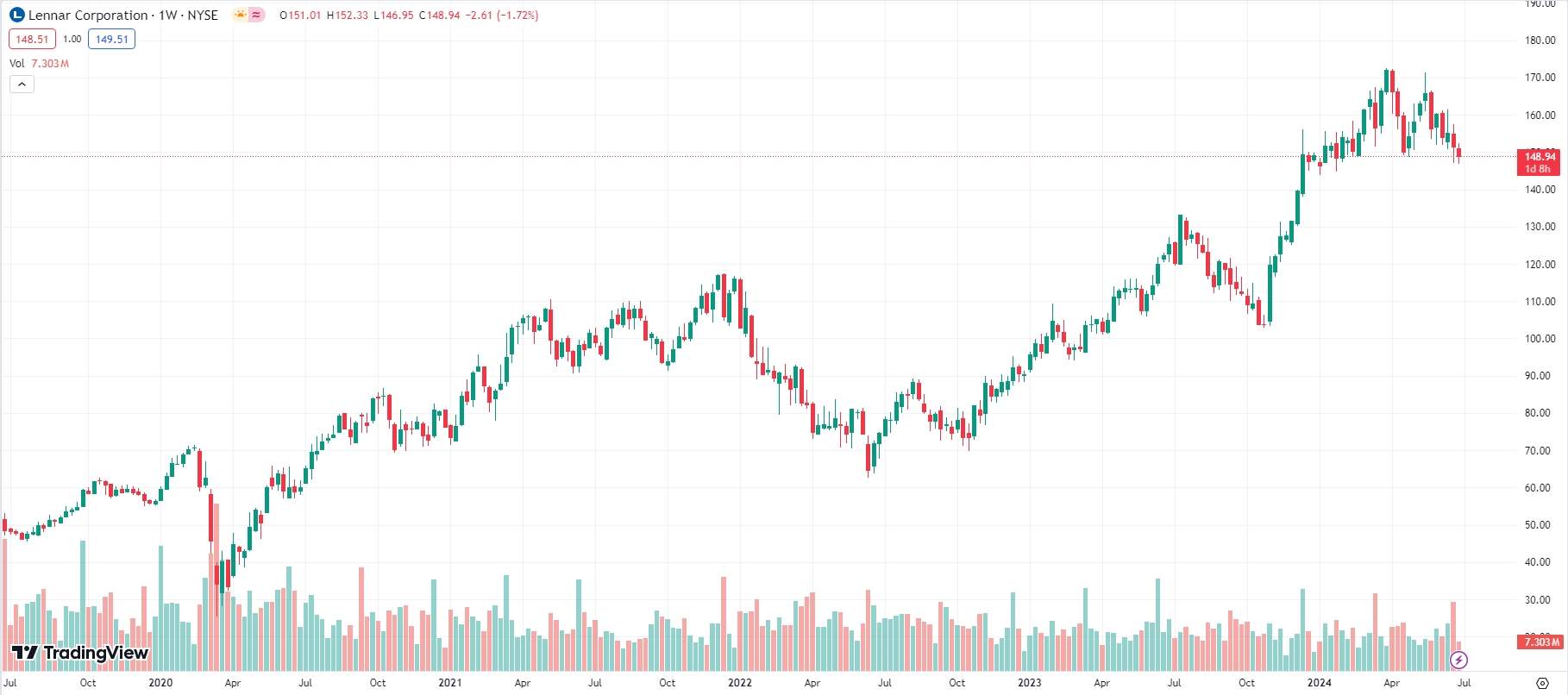
D.R. Horton, Inc. (DHI). The largest homebuilder in the U.S., known for its wide range of homes and affordable prices.
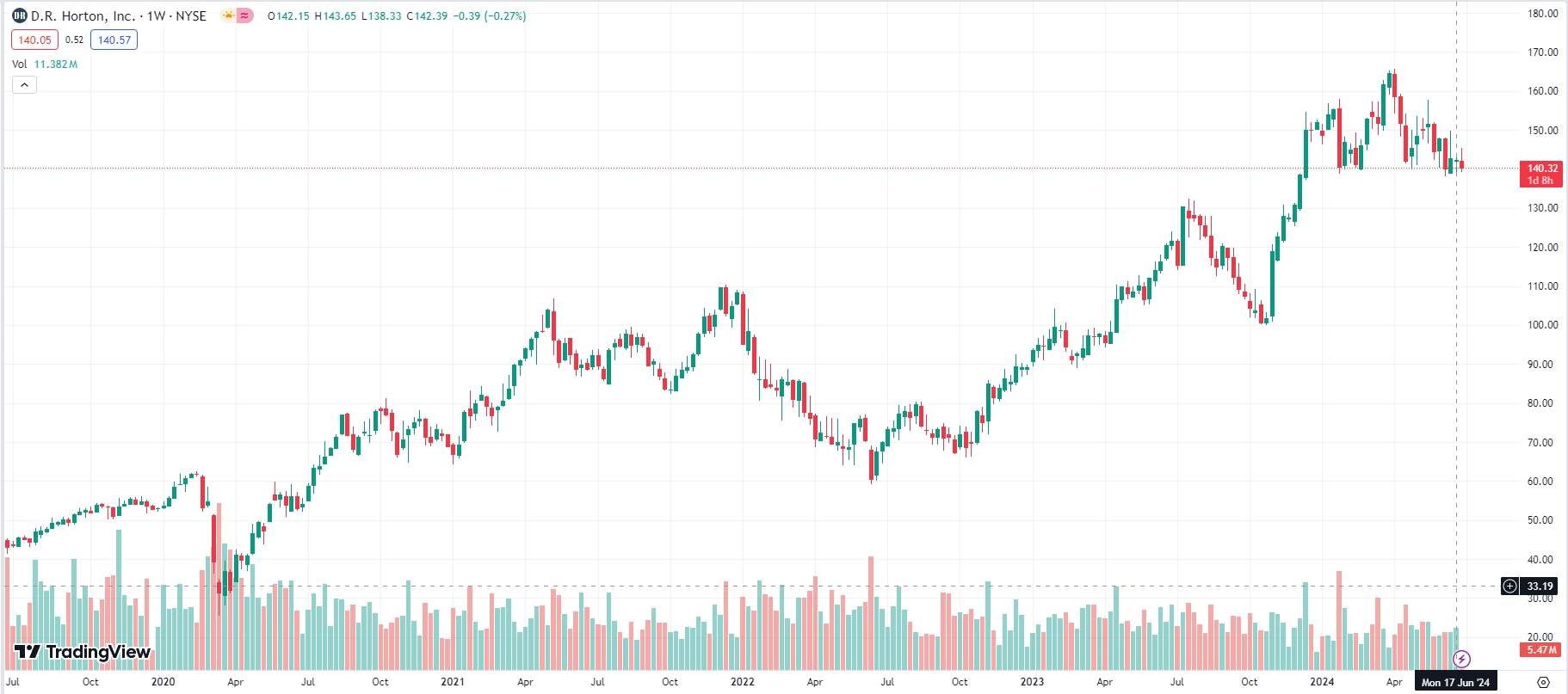
PulteGroup, Inc. (PHM). A leading homebuilder offering a broad spectrum of residential properties across various price ranges.
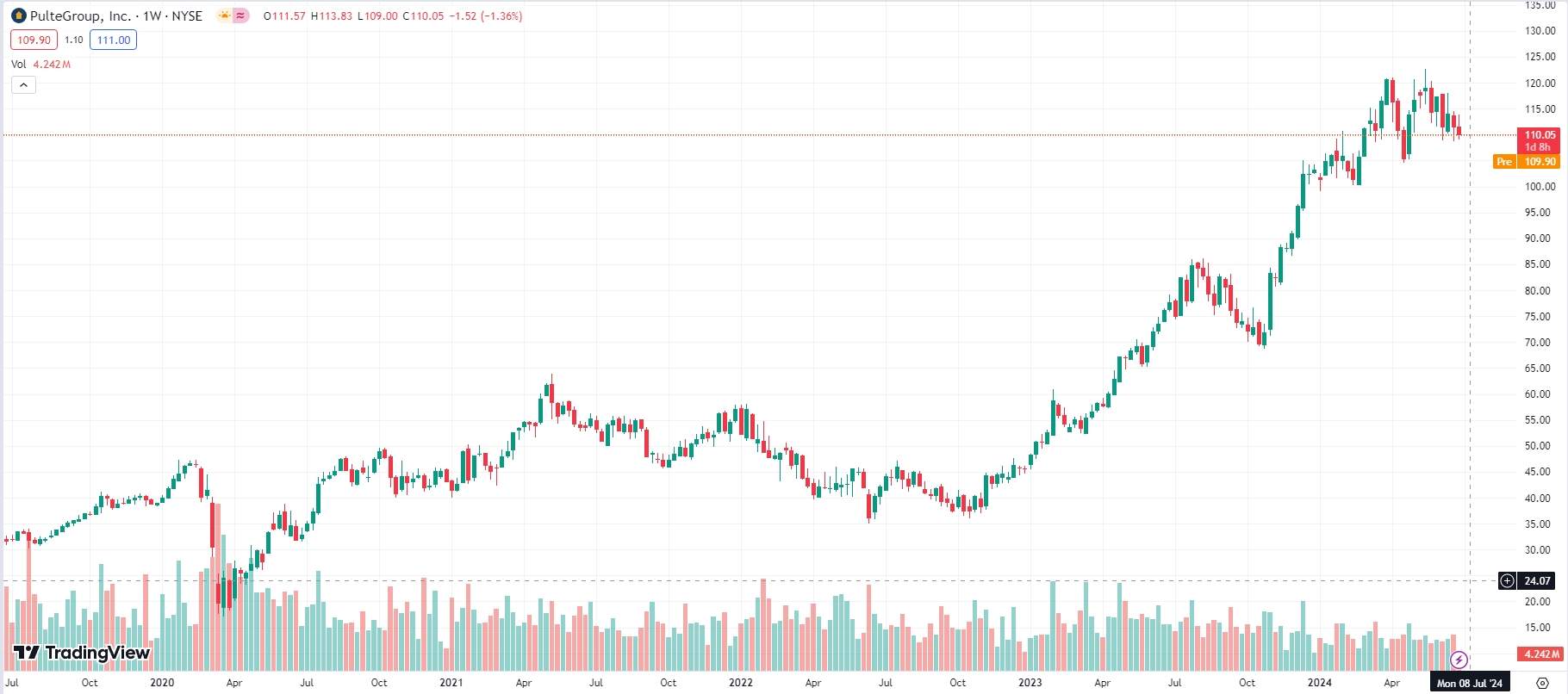
Toll Brothers, Inc. (TOL). A luxury homebuilder specializing in high-end homes and residential communities.
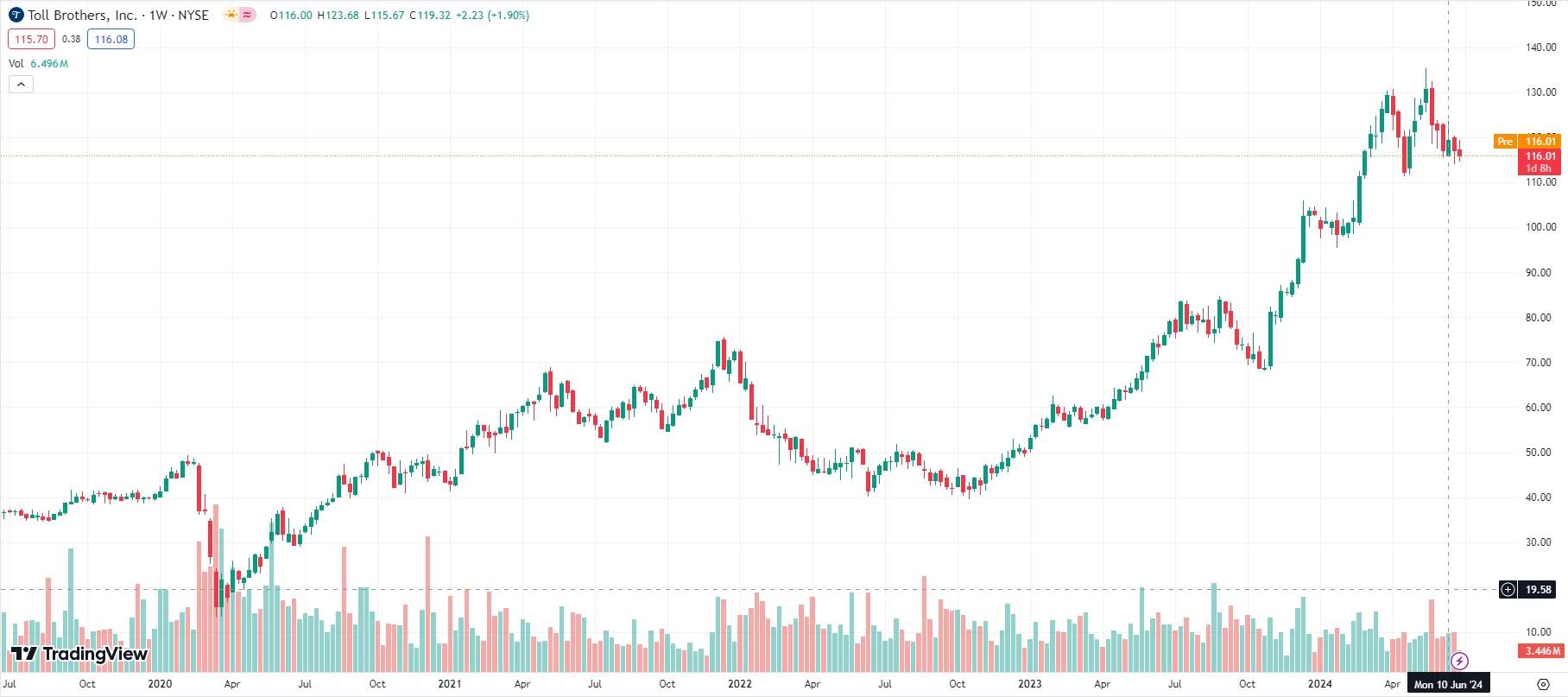
NVR, Inc. (NVR). One of the largest homebuilders in the U.S., offering homes under the Ryan Homes, NVHomes, and Heartland Homes brands.
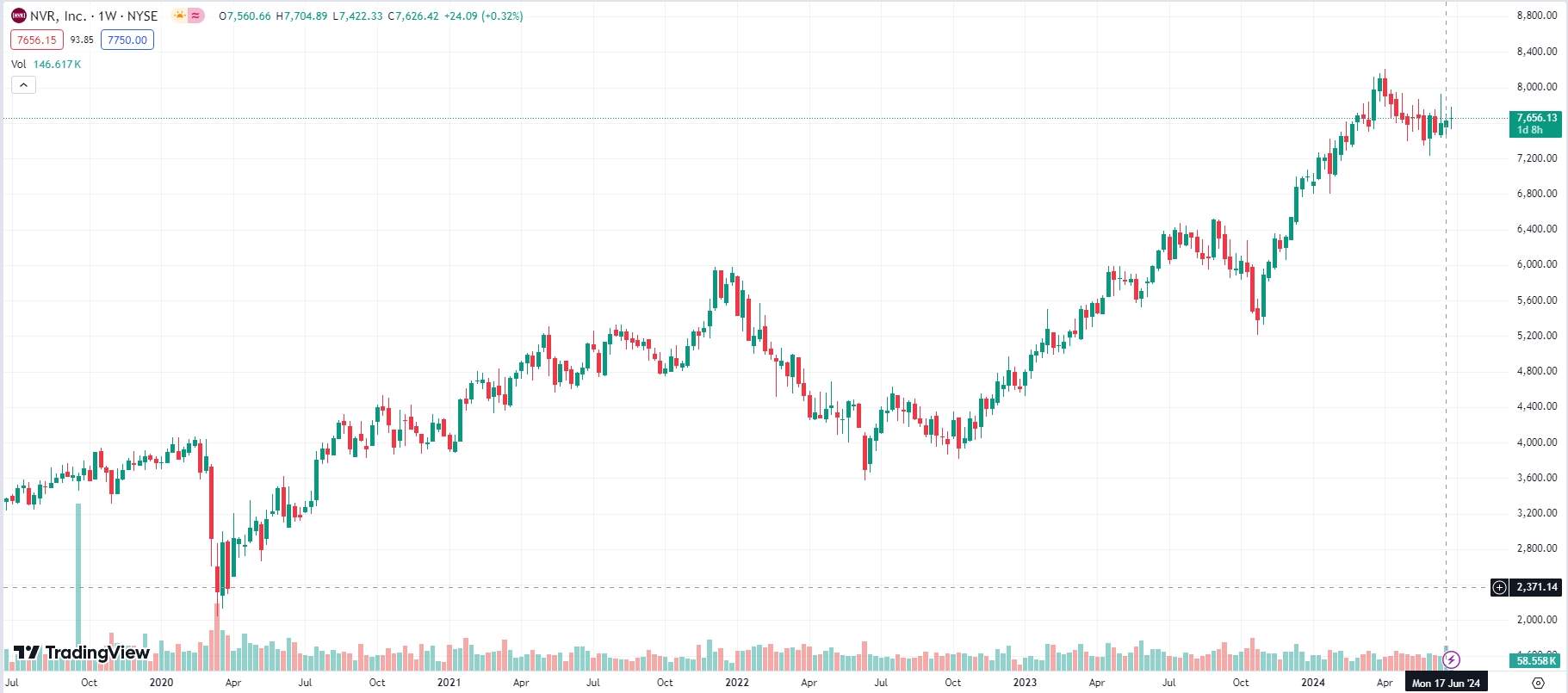
KB Home (KBH). Known for providing affordable homes and innovative building solutions.
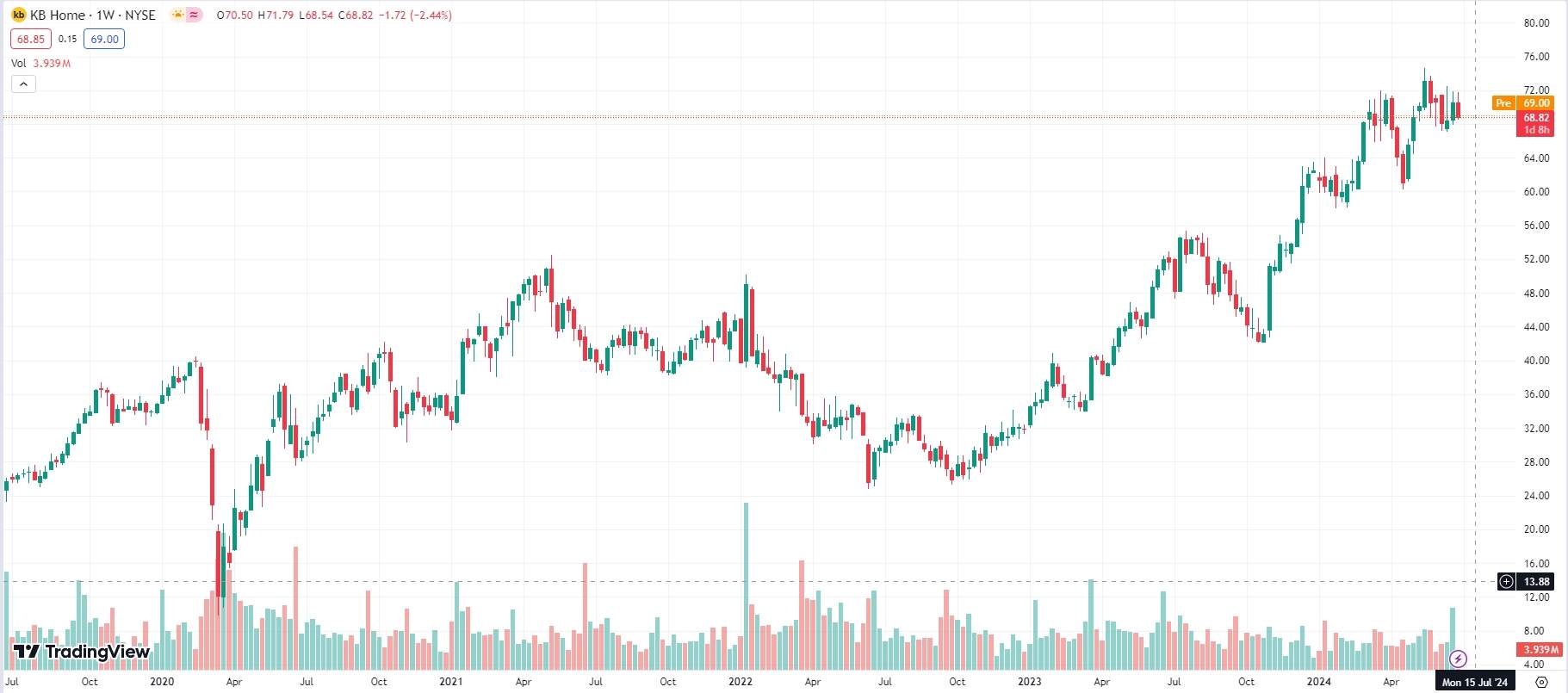
Meritage Homes Corporation (MTH). A homebuilder known for its energy-efficient homes and sustainable building practices.
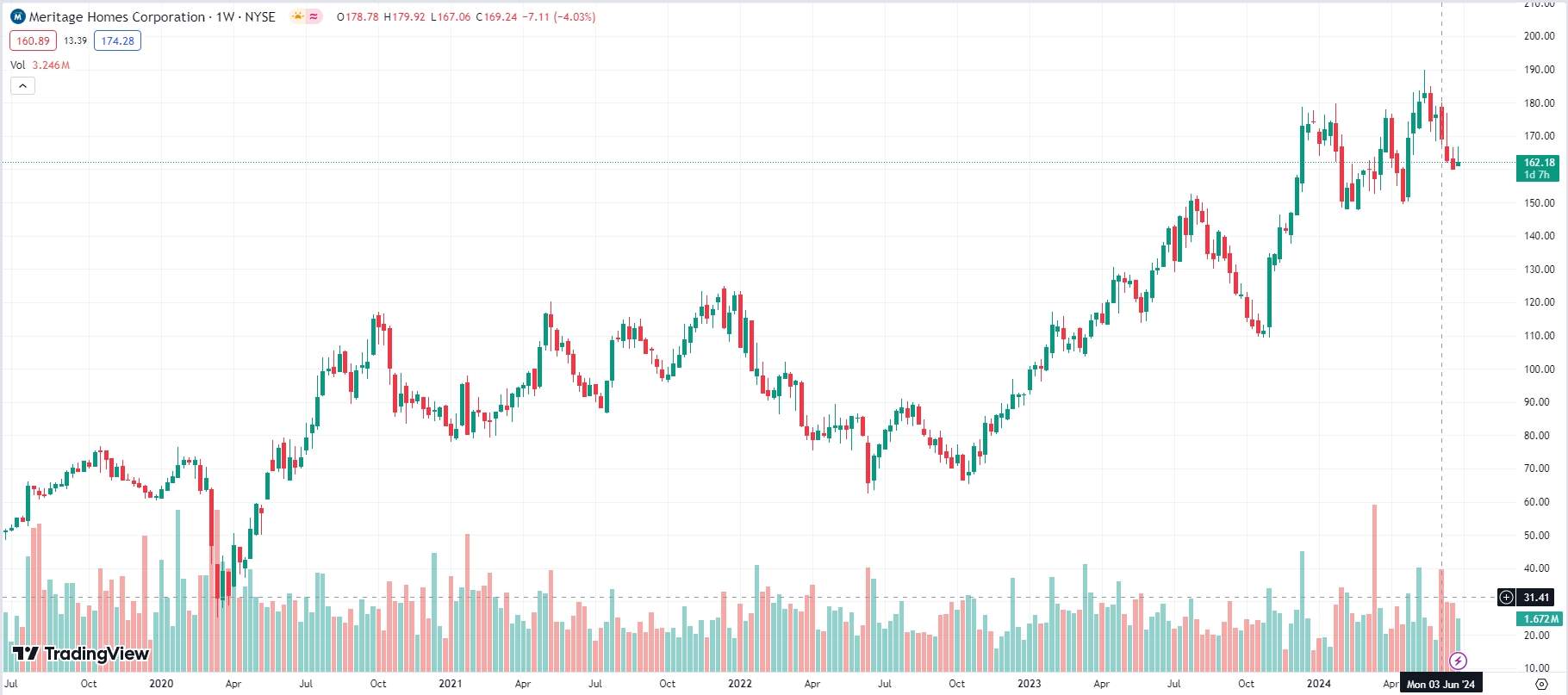
LGI Homes, Inc. (LGIH). Specializes in constructing affordable homes for first-time buyers.
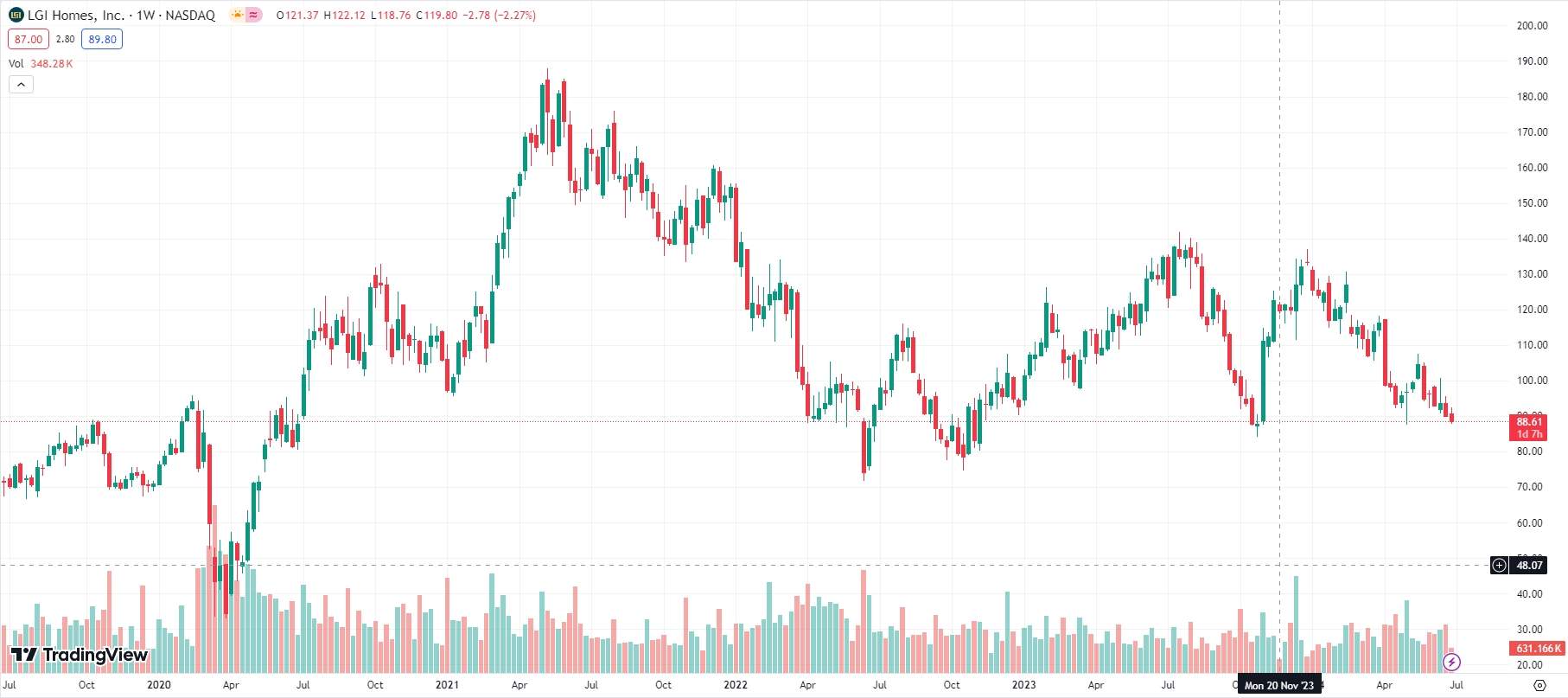
Century Communities, Inc. (CCS). Offers a wide range of residential properties nationwide.
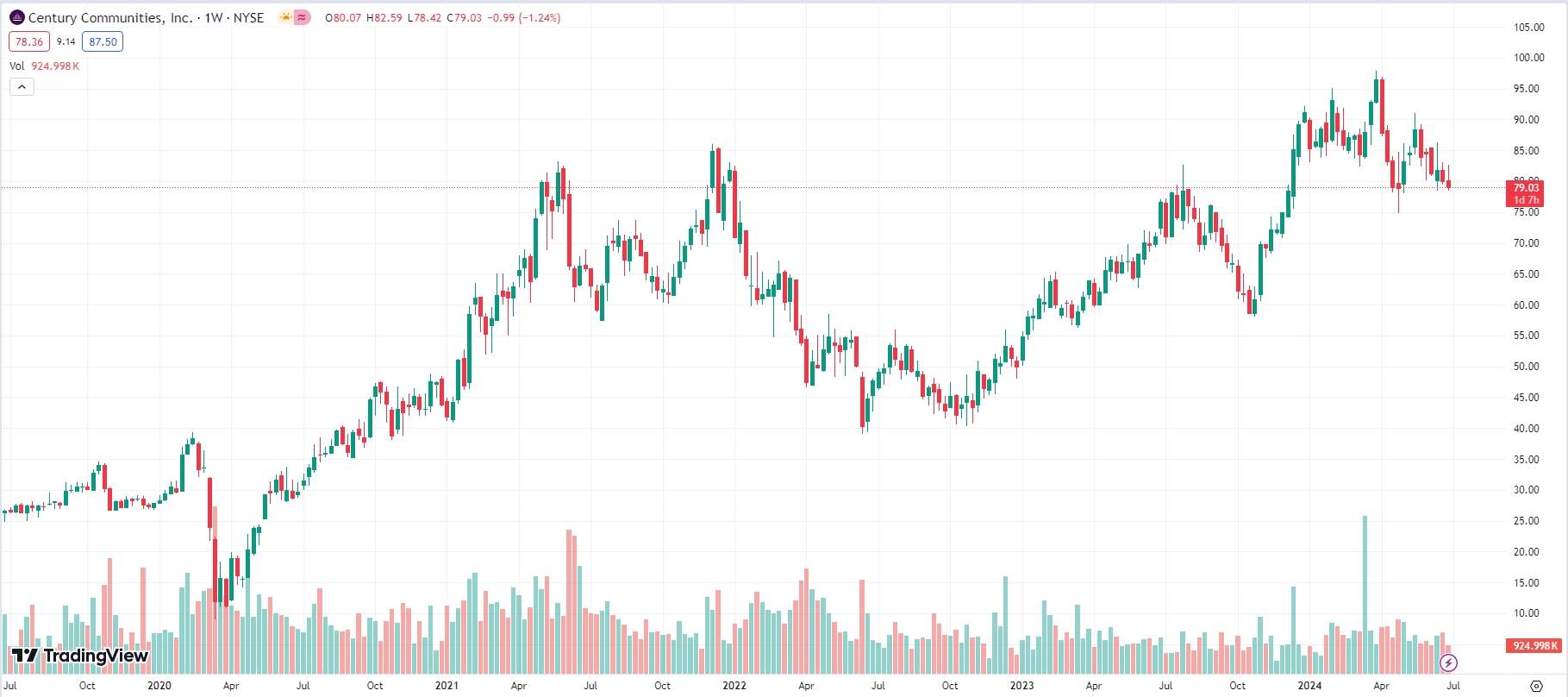
Taylor Morrison Home Corporation (TMHC). A leading homebuilder known for its quality homes and excellent customer service.
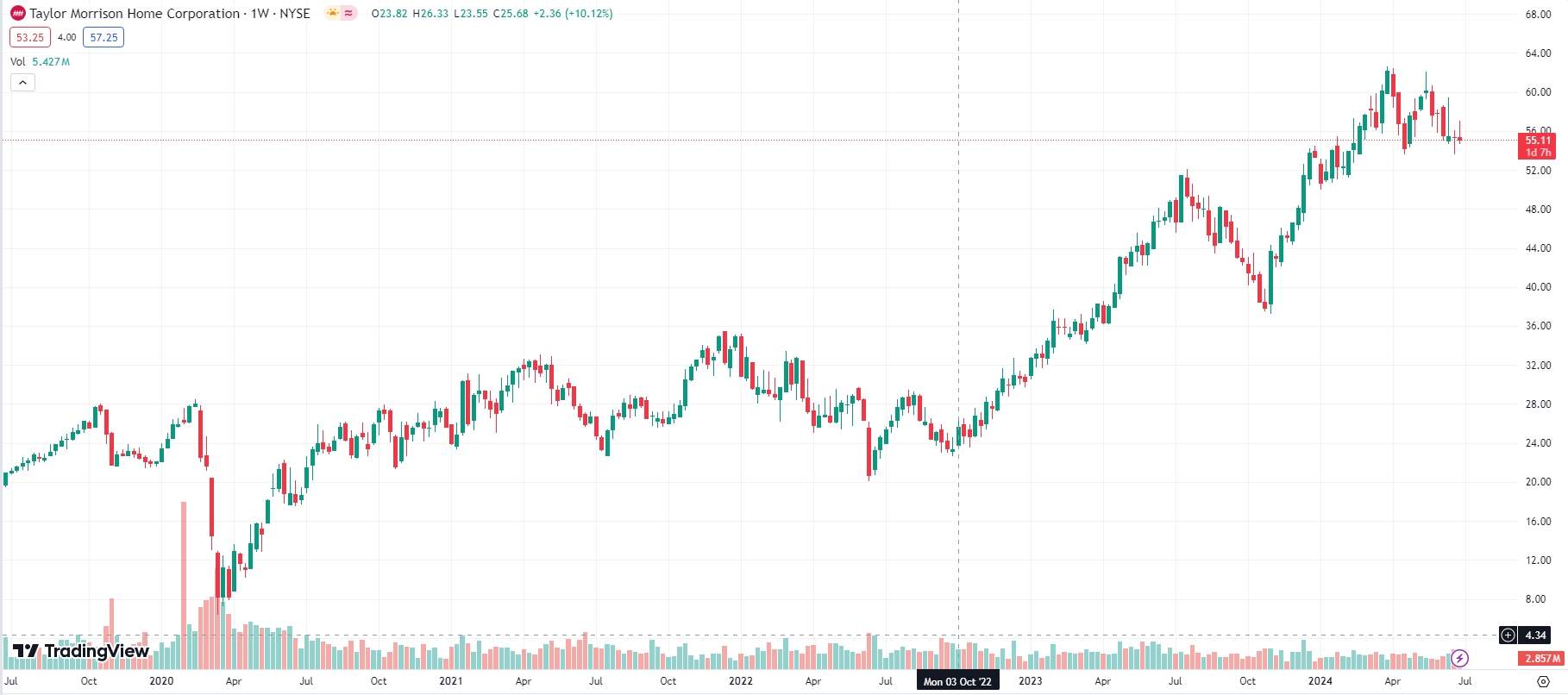
To buy top real estate stocks, we have selected several brokers. They open the doors to the stock market where you can buy shares of the above mentioned companies and shares of other companies you like. These brokers are reliable and offer good terms on deals.
| Broker | Demo | Minimum account, $ | Signals (Alerts) | Research and data | Stocks/ETFs Fee per share basic | Stocks/ETFs per share min | Open an account |
|---|---|---|---|---|---|---|---|
Yes | 100 | Yes | Yes | No | No | ||
| DEGIRO | No | 0 | No | Yes | €2,00 + €0,038 per share for US stocks | €2,00 for US stocks | |
| CapTrader | Yes | 2000 | Yes | Yes | US Stocks: $0.01 per share; min fee of $2, max of 1% of the trade value. EU Stocks: 0.1% of trade value with a min fee of €4 and a max of €99. | US Stocks $2, EU Stocks €4 | |
| Revolut | No | 0 | No | Yes | After exceeding the free trades, the fee is 0.25% of the order amount, with a min fee of £1.00 (or equivalent in other currencies) | £1.00 in the UK, €1.00 in the Eurozone | |
| Interactive Brokers | Yes | 0 | Yes | Yes | 0 | $1,00 |
How to choose the right real estate stocks?
Choosing the right real estate stocks involves a thorough analysis of various factors to ensure that your investments align with your financial goals and risk tolerance. Here’s a step-by-step guide to help you choose real estate stocks:
1. Understand the types of real estate stocks
Real Estate Investment Trusts (REITs): Companies that own, operate, or finance income-producing real estate across various property sectors. REITs are required to distribute at least 90% of their taxable income to shareholders as dividends.
Real Estate Operating Companies (REOCs): Companies that engage in real estate management and development but are not bound by the dividend distribution requirement of REITs.
2. Research the market sectors
Residential: Involves apartments, single-family homes, and manufactured housing.
Commercial: Includes office buildings, retail spaces, and industrial properties.
Healthcare: Properties like hospitals, nursing facilities, and medical offices.
Hospitality: Hotels and resorts.
Specialty: Includes data centers, cell towers, and other niche markets.
3. Evaluate financial performance
Revenue Growth: Look for companies with consistent revenue growth, indicating strong demand and effective management.
Funds From Operations (FFO): A key metric for REITs, representing cash generated by real estate operations. It excludes depreciation and amortization, giving a clearer picture of profitability.
Dividend Yield and Stability: Check the dividend yield and its stability over time. REITs typically offer higher yields, but stability is crucial to ensure ongoing returns.
Debt Levels: Analyze the company’s debt-to-equity ratio and interest coverage ratio. High debt levels can be risky, especially in a rising interest rate environment.
4. Assess management and governance
Management Track Record: Research the experience and track record of the management team. Successful management teams often have a history of effective property acquisitions, development, and tenant relationships.
Corporate Governance: Strong corporate governance practices, including transparent reporting and shareholder-friendly policies, are essential for long-term investment success.
5. Analyze market trends and economic indicators
Economic Conditions: Real estate performance is closely tied to economic conditions. Consider factors such as GDP growth, employment rates, and interest rates.
Market Demand: Look at trends in property demand and supply within the specific sectors the company operates. High demand and low supply can drive property values and rental income.
6. Review property portfolio
Geographic Diversification: A well-diversified geographic portfolio can mitigate risks associated with local economic downturns.
Property Quality and Location: High-quality properties in prime locations typically offer better income stability and appreciation potential.
7. Consider long-term growth potential
Development Pipeline: Companies with a strong pipeline of development projects may offer significant growth potential.
Acquisition Strategy: Companies that effectively acquire and integrate new properties can drive growth.
8. Evaluate risk factors
Tenant Concentration: High tenant concentration can be risky if major tenants default on their leases.
Market Cyclicality: Understand the cyclical nature of the real estate market and be prepared for potential downturns.
Why invest in real estate stocks?
Real estate stocks are shares of companies that operate in the real estate market, from the construction and management of commercial properties to the sale of residential properties. These are developers, construction firms, real estate agencies and property management companies.
The advantages of REITs include high liquidity because they are publicly traded and mandatory distribution of a significant portion of profits to shareholders in the form of dividends. The main benefits also include:
Portfolio diversification. Investing in real estate stocks and REITs helps diversify your investment portfolio, reducing risk by spreading your investments across different sectors.
Growth potential and stable income. Real estate companies often show stable growth and are able to generate regular income in the form of dividends. This makes them attractive to long-term investors looking for stable sources of income.
Inflation protection. Real estate has traditionally been considered a good hedge against inflation.
Regular portfolio review can help improve overall investment returns
Buying real estate shares can be a challenging process, especially for first-time investors. Here you should take into account macroeconomic factors such as interest rates and economic growth, which can significantly influence the real estate market. Personally, I also recommend paying attention to local regulatory changes and tax incentives, which can significantly affect the return on your investment. Investors should consider not only diversifying among different REITs and stocks, but also investing in different geographic regions. This will help reduce risks associated with regional economic downturns or changes in local politics. In addition, regular portfolio review and review, as well as the use of analytical tools to assess risk, can help improve overall investment returns and stability.
Conclusion
Investing in real estate stocks and REITs is a reliable way to grow capital and earn a stable income. With their help, investors can effectively diversify their portfolios and take advantage of different segments of the real estate market. It is important to approach stock and REIT selection with careful analysis and strategy to minimize risk and maximize returns.
FAQs
How do macroeconomic factors influence the purchase of real estate stocks?
Macroeconomic factors such as interest rates, economic growth and inflation greatly influence the real estate market. Higher interest rates increase borrowing costs, which reduces demand for real estate and reduces the profitability of REITs and real estate stocks. Economic growth and low interest rates, on the contrary, stimulate demand and contribute to rising property prices.
What regulatory changes should I consider when investing in real estate stocks?
Investors should consider changes in laws regarding taxation, leasing and zoning. For example, tax breaks on rental income make investments more attractive, while new laws restricting rental or construction reduce returns. Regular monitoring of the regulatory environment will help you respond to changes in a timely manner.
What alternative real estate investment strategies are there?
In addition to buying real estate shares, alternative strategies include investing in real estate through crowdfunding platforms, purchasing real estate for rental purposes, and participating in investment groups that manage real estate on behalf of investors. These strategies allow you to diversify your investments and reduce the risks associated with direct ownership of real estate.
What analytical tools can be used to assess the risks of investing in real estate stocks?
To assess risk, investors can use a variety of analytical tools, such as company financial statements, market indices, vacancy and rental rate data, and economic growth forecasts. Technical analysis and risk assessment models also help identify potential threats and investment opportunities.
Related Articles
Team that worked on the article
Parshwa is a content expert and finance professional possessing deep knowledge of stock and options trading, technical and fundamental analysis, and equity research. As a Chartered Accountant Finalist, Parshwa also has expertise in Forex, crypto trading, and personal taxation. His experience is showcased by a prolific body of over 100 articles on Forex, crypto, equity, and personal finance, alongside personalized advisory roles in tax consultation.

Dr. BJ Johnson is a PhD in English Language and an editor with over 15 years of experience. He earned his degree in English Language in the U.S and the UK. In 2020, Dr. Johnson joined the Traders Union team. Since then, he has created over 100 exclusive articles and edited over 300 articles of other authors.
Mirjan Hipolito is a journalist and news editor at Traders Union. She is an expert crypto writer with five years of experience in the financial markets. Her specialties are daily market news, price predictions, and Initial Coin Offerings (ICO).
Economic indicators — a tool of fundamental analysis that allows to assess the state of an economic entity or the economy as a whole, as well as to make a forecast. These include: GDP, discount rates, inflation data, unemployment statistics, industrial production data, consumer price indices, etc.
An investor is an individual, who invests money in an asset with the expectation that its value would appreciate in the future. The asset can be anything, including a bond, debenture, mutual fund, equity, gold, silver, exchange-traded funds (ETFs), and real-estate property.
Crypto trading involves the buying and selling of cryptocurrencies, such as Bitcoin, Ethereum, or other digital assets, with the aim of making a profit from price fluctuations.
Diversification is an investment strategy that involves spreading investments across different asset classes, industries, and geographic regions to reduce overall risk.
Options trading is a financial derivative strategy that involves the buying and selling of options contracts, which give traders the right (but not the obligation) to buy or sell an underlying asset at a specified price, known as the strike price, before or on a predetermined expiration date. There are two main types of options: call options, which allow the holder to buy the underlying asset, and put options, which allow the holder to sell the underlying asset.






























































































































